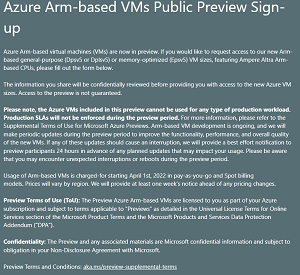News
Microsoft Dev Tooling Onboard with New Arm-Based Azure VMs
In announcing a preview of Azure virtual machines (VMs) based on Arm-based processors earlier this month, Microsoft noted that much of its development tooling already or soon will support the new scheme.
"Most major developer platforms and languages are gearing up to, or already provide Arm support and the inherent benefits that this processor architecture brings," the company said in an April 4 blog post.
Featuring the Ampere Altra Arm-based processor, the new VMs are engineered to efficiently run scale-out workloads of many types including web servers, application servers, open source databases, cloud-native/rich .NET applications, Java applications, gaming servers, media servers and more. Arm chips are based on Reduced Instruction Set Computing (RISC), commonly used for smartphones and other low-power devices, while more mainstream x86 chips leverage Complex Instruction Set Computing (CISC). Microsoft says it has seen up to 50 percent better price-performance than comparable x86-based VMs for those scale-out workloads.
Microsoft pointed out how its development tooling supports Arm-based computing.
"The modern .NET platform introduced native support for the Arm architecture on Linux starting with .NET 5 and has built upon that with the recent .NET 6 release," the company said. "With C# 10 and F# 6, .NET 6 delivers language improvements that simplify your code. Additionally, a new dynamic profile-guided optimization (PGO) system delivers deep optimizations that are only possible at runtime, driving significant gains in performance that can reduce the cost of running cloud services in Azure, improved cloud diagnostics, and access to many new APIs. With the introduction of native support for Arm in the .NET Framework 4.8.1 (currently in preview and available as part of the latest Windows 11 Insider Preview builds), investments in the vast ecosystem of .NET Framework apps can also now leverage the benefits of running these workloads on Arm."
Microsoft also offered several other examples:
- The latest Microsoft Visual C++ tools that come with Visual Studio 17.2 previews let developers not just run apps, but also build natively for Arm, on Arm.
- Thanks to Microsoft's recent JEP 388 contribution to OpenJDK, Java applications can now run on a wider range of Arm systems with no additional changes.
- The company's own Microsoft Build of OpenJDK provides binaries for Windows, Linux and macOS on compatible Arm hardware for Java 11 and Java 17.
- Visual Studio Code, running natively on Arm, helps developers leverage the cloud for both production environments and development environments.
 [Click on image for larger view.] Preview Access (source: Microsoft).
[Click on image for larger view.] Preview Access (source: Microsoft).
The preview of Arm-based Azure VMs is initially available in the West US 2, West Central US and West Europe Azure regions, with developers invited to participate by going here to sign up (see graphic above).
Next week, Microsoft will conduct a webinar for developers to learn how to build cloud infrastructure for cost-effective scale-out Linux applications with the latest Ampere Altra Arm-based Azure VMs, titled "New Innovations with Azure Core Compute."
About the Author
David Ramel is an editor and writer at Converge 360.